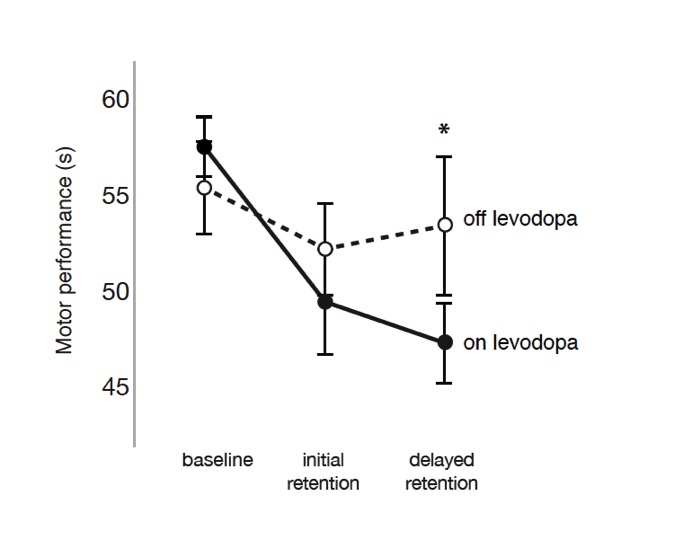Session Information
Date: Tuesday, June 6, 2017
Session Title: Therapy in Movement Disorders
Session Time: 1:45pm-3:15pm
Location: Exhibit Hall C
Objective: To determine whether i) dopamine replacement medication affects learning of an upper limb (UL) feeding task in people with Parkinson disease (PD), and ii) training “on” levodopa medication affects the transfer of movement skill to untrained UL tasks compared to training “off” medication.
Background: Impaired motor learning in PD may be due to dopamine deficiency in portions of the basal ganglia, or to “overdosing” other portions of the basal ganglia with exogenous dopamine. Previous research has suggested that exogenous dopmaine may suppress the activation of the associative striatum during the early acquisition stages of motor learning. [1] However, this theory has not been rigorously tested in functional UL tasks. Successful learning of UL tasks may improve UL function in people with PD.
Methods: 20 participants with PD were randomized to train “on” (n=10) or “off” (n=10) levodopa medication. Participants performed 10 blocks of five trials of a simulated feeding task with their non-dominant UL over three consecutive days (acquisition period), followed by a single block of five trials two (initial retention) and nine (delayed retention) days later. Participants were also assessed on the nine hole peg test and a buttoning task “on” levodopa before acquisition and during delayed retention. Faster times indicated better performance for all tasks.
Results: Participants who trained “on” levodopa significantly improved performance at initial (p=.03) and delayed (p=.02) retention compared to those who trained “off” levodopa, controlling for baseline performance during the first acquisition block. There was no between-group difference in performance carryover between end of acquisition to either retention session (p=.81–.84). Participants who trained “on” levodopa appeared to improve performance on untrained tasks (i.e., transfer) while those who trained “off” levodopa appeared to worsen, but these results were not statistically significant (p=.41–.87).
Conclusions: People with PD successfully learned and retained performance of an UL task when training “on” levodopa medication but were unsuccessful at learning this task “off” medication. Future studies should investigate the impact of fatigue on learning and transfer to unlearned tasks performed “off” medication.
References: [1] Vaillancourt et al. Dopamine overdose hypothesis: evidence and clinical implications. Mov Disord. 2013;28:1920-9.
To cite this abstract in AMA style:
S. Paul, C. Walter, G. Olivier, L. Dibble, S. Schaefer. Dopamine replacement medication improves acquisition, retention, and transfer of skilled upper extremity movement in people with Parkinson Disease. [abstract]. Mov Disord. 2017; 32 (suppl 2). https://www.mdsabstracts.org/abstract/dopamine-replacement-medication-improves-acquisition-retention-and-transfer-of-skilled-upper-extremity-movement-in-people-with-parkinson-disease/. Accessed January 16, 2026.« Back to 2017 International Congress
MDS Abstracts - https://www.mdsabstracts.org/abstract/dopamine-replacement-medication-improves-acquisition-retention-and-transfer-of-skilled-upper-extremity-movement-in-people-with-parkinson-disease/

